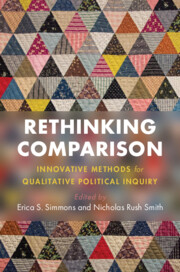Book contents
- Frontmatter
- Dedication
- Contents
- List of Figures
- List of Tables
- List of Contributors
- Acknowledgments
- 1 Rethinking Comparison: An Introduction
- Part I Rethinking the Building Blocks of Comparison
- 2 Beyond Mill: Why Cross-Case Qualitative Causal Inference Is Weak, and Why We Should Still Compare
- 3 Two Ways to Compare
- 4 Unbound Comparison
- 5 On Casing a Study versus Studying a Case
- 6 From Cases to Sites: Studying Global Processes in Comparative Politics
- Part II Developing New Approaches to Comparison through Research
- Theory and Imagination in Comparative Politics: An Interview with Lisa Wedeen
- Index
5 - On Casing a Study versus Studying a Case
from Part I - Rethinking the Building Blocks of Comparison
Published online by Cambridge University Press: 24 September 2021
- Frontmatter
- Dedication
- Contents
- List of Figures
- List of Tables
- List of Contributors
- Acknowledgments
- 1 Rethinking Comparison: An Introduction
- Part I Rethinking the Building Blocks of Comparison
- 2 Beyond Mill: Why Cross-Case Qualitative Causal Inference Is Weak, and Why We Should Still Compare
- 3 Two Ways to Compare
- 4 Unbound Comparison
- 5 On Casing a Study versus Studying a Case
- 6 From Cases to Sites: Studying Global Processes in Comparative Politics
- Part II Developing New Approaches to Comparison through Research
- Theory and Imagination in Comparative Politics: An Interview with Lisa Wedeen
- Index
Summary
To rethink comparison, it is useful to begin with a more basic question: What are these things we compare when we do comparative research? Researchers are typically taught to think of a field site as a case (noun) that they will go out and study (verb). Cases are defined by virtue of the fact that they fall within a conceptually defined class: they exist “out there,” in a sense, before we even arrive. Valuable as it may be, this “realist” approach has often felt foreign to ethnographers and other practitioners of interpretive research. In the immersive work characteristic of interpretive research, we often enter research sites for practical and political reasons – or because of considerations related to language, cultural familiarity, funding, or something else. Even if we choose a site for primarily analytic purposes, we typically pursue research in ways that prioritize discovery and embrace changes in research interests, goals, and questions. For these and other reasons, we often wind up with an emerging study (noun) that we need to case (verb). As we develop accounts of experience-near concepts, relations, processes and practices, we repeatedly encounter the challenge of how to place them in dialogue with the experience-distant conceptual frameworks of our field. Examining what we have studied, we ask “what is this a case of?”
Keywords
- Type
- Chapter
- Information
- Rethinking ComparisonInnovative Methods for Qualitative Political Inquiry, pp. 84 - 106Publisher: Cambridge University PressPrint publication year: 2021
- 12
- Cited by

